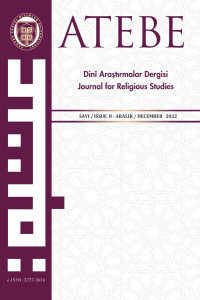A Review of The Critique of Methods of Historical Criticism and the Problem of its Application to Islamic Traditions by Fatma Betül Altıntaş (Ankara: TDV Publications, 2020), 522 pages, ISBN: 9786057580665
Abstract
One of the issues of humanity has emphasized throughout history is transmission of words to future generations. Humanity has tried to find solutions and to prepare conditions to protect traditions, lyrics, and texts most accurately. Islamic civilization has been more advanced in terms of the transmission of words such as hadiths and other Islamic narratives compared to the civilizations of its time. The West developed several methods of criticism on the texts of the Bible after the ancient texts, reform, and enlightenment. These advanced methods, which are seen as the next step of content criticism, are called “historical criticism methods”. In this study, the author deals with historical criticism methods, critiques made to these methods, and the problem of applying them to Islamic narratives in various aspects.
References
- Altıntaş, Fatma Betül. Tarihsel Eleştiri Yöntemleri ve İslâmî Rivayetlere Uygulanması Sorunu. Ankara: Türkiye Diyanet Vakfı, 2020.
Abstract
References
- Altıntaş, Fatma Betül. Tarihsel Eleştiri Yöntemleri ve İslâmî Rivayetlere Uygulanması Sorunu. Ankara: Türkiye Diyanet Vakfı, 2020.
Tarihsel Eleştiri Yöntemleri Tenkidi ve İslâmî Rivayetlere Uygulanması Sorunu, yazar Fatma Betül Altıntaş (Ankara: TDV Yayınları, 2020), 529 sayfa, ISBN: 9786057580665
Abstract
İnsanlığın tarih boyunca üzerinde önemle durduğu konulardan birisi de sözün gelecek nesillere korunarak aktarılması olmuştur. İnsanlık, geleneklerin, söz ve metinlerin korunması ve geleceğe en doğru şeklide aktarılması için kendi zamanlarının ve şartlarının gereğince bir çözüm bulmaya çalışmıştır. İslam medeniyeti de gerek hadislerin gerek diğer İslâmî rivayetlerin aktarımı konusunda kendi dönemindeki medeniyetlere göre oldukça ileri düzeyde yer almıştır. Batı, başta antik metinler, Reform ve Aydınlanma sonrasında Kitâb-ı Mukaddes metinleri üzerinde birtakım tenkit yöntemleri geliştirmiştir. İçerik tenkidinin bir sonraki adımı olarak görülen bu ileri tenkit yöntemleri tarihsel eleştiri yöntemleri olarak adlandırılmaktadır. Değerlendireceğimiz bu çalışmada yazar, tarihsel eleştiri yöntemlerini, bu yöntemlere yapılan tenkitleri ve İslâmî rivayetlere uygulanması problemini çeşitli yönleriyle ele almaktadır.
References
- Altıntaş, Fatma Betül. Tarihsel Eleştiri Yöntemleri ve İslâmî Rivayetlere Uygulanması Sorunu. Ankara: Türkiye Diyanet Vakfı, 2020.
Details
| Primary Language | Turkish |
|---|---|
| Subjects | Religion, Society and Culture Studies |
| Journal Section | Book Reviews |
| Authors | |
| Publication Date | December 31, 2022 |
| Submission Date | October 21, 2022 |
| Published in Issue | Year 2022 Issue: 8 |

This work is licensed under a Creative Commons Attribution-NonCommercial 4.0 International License.


